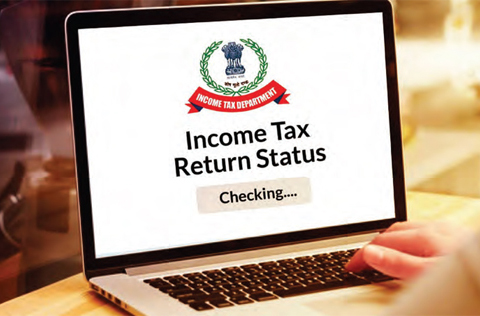AIS – New Aid to File Tax Returns

A new tool called the Annual Information Statement (AIS) provided by the Income Tax department is intended to help taxpayers keep track of their financial transactions of incomes and outgoings and file returns accordingly. This information is what the Tax department already has about our money dealings under a comprehensive list of categories, so we do not miss out – intentionally or unintentionally – while filing our returns. Since even innocent mistakes can lead to heavy penalties, the AIS serves as as a guiding tool to honest tax payers, and a warning bell to others.
I remember an incident of the year 1979. I was then an assessing officer with the Income tax Department in Bombay (now Mumbai). My jurisdiction was over high tax paying advocates and solicitors. One day, I was pleasantly surprised when against a routine scrutiny notice, Late Nani Palkhivala appeared in person in his personal case. He was then the Indian Ambassador to the US. We all know that Mr Palkhivala has been almost like a father figure for income tax laws and both taxmen and chartered accountants read his book on tax laws as the Bible on income tax legislation even today. I was more surprised when I found that he had come to my office along with a chartered accountant who had been assisting him in his assessment proceedings before me. Out of curiosity I asked him, “Sir, why do you need a chartered accountant when nobody knows tax laws better than you?” He modestly replied that though he may be given some credit for knowing income tax laws, even for him it was practically difficult filing tax returns and giving clarifications about them in his assessment proceedings.
Taxing web
This is really true. Filing tax returns has been difficult due to a plethora of tax provisions which keep changing every year. If the late Nani Palkhivala found it difficult, then what about the ordinary taxpayer? It has been my experience that many times black sheep escape but honest taxpayers get caught in the web of provisions and commit innocent mistakes. I recollect a sad incident when an officer under me had caught a school teacher who had not considered a small amount of interest income earned on his savings bank account. The teacher had filed the return on his own as he could not afford to hire a chartered accountant.
In this background of continuing problems faced by taxpayers while filing income tax returns, the tax department has come forward with the Annual Information Statement (AIS) to help taxpayers. The AIS was launched in October 2021 and the same is available in form 26AS on the income-tax returns billing portal of the Government of India. The objective behind AIS is to remind taxpayers about the details of the income of the taxpayers along with the relevant outgoings from their income which may be needed while filing the return of income. The other necessary details of TDS and TCS will also be available there. AIS can be understood as a comprehensive statement containing details of all financial transactions undertaken by you in a financial year, i.e, it contains information that is specified under the Income-Tax Act.
Known data
In a nutshell, it is the statement of information that the income tax department already knows about you. The department has a massive directorate system and it is their assigned job to correlate information collected from the field, which mainly come from authorised third parties based on your PAN. AIS has also incorporated a system of feedback and in case a taxpayer points out any mistake in the reported information then the same will be checked and modified if needed. AIS, as is felt by the tax department, will ensure that taxpayers file the returns of income on time and without unintended mistakes on the facts relating to them.
But the point to be noted is that the information furnished by the department is only that which will help in filing the returns. The department may not disclose all the information it may have about a taxpayer or a potential taxpayer.
AIS Information Categories:
The broad categories of information given in the AIS will be as under:
- Salary
- Rent received
- Dividend
- Interest from saving banks
- Interest from others
- Interest from income tax refund
- Rent on plant and machinery
- Winnings from horse races – Section 115 BB of the I.T Act
- Winnings from Lotteries or Crossword puzzles
- Receipt of accumulated balance of P.F from employer
- Interest from infrastructure debt fund
- Interest from specified company by a non-resident
- Interest from bonds and government securities
- Income in respect of units of non-resident
- Income from long-term capital gains from units by an offshore fund
- Income from long-term capital gains from currency bonds or shares of Indian companies
- Insurance commission
- Receipts from insurance policy
- Income of foreign institutional investors from securities – 115 AD
- Withdrawal of deposits under the National Savings Scheme
- Receipt of commission etc., on the sale of lottery tickets
- Income from investment in securitization trusts
- Income on account of repurchase of units by MF/UTI
- Interest on dividend or other sums payable to the government.
- Sale of land or building
- Receipts for transfer of immovable property
- Sale of vehicle
- Sale of securities and units of mutual fund
- Off market debit transactions
- Off market credit transactions
- Business receipts
- Business expenses
- Rent payment
- Miscellaneous payment
- Cash deposits
- Cash withdrawals
- Cash payments
- Outward foreign remittance/purchase of foreign currency
- Receipt of foreign remittance
- Payment of non-resident sportsmen or sports associations
- Foreign travel
- Purchase of immovable property
- Purchase of vehicle
- Purchase of time deposits
- Purchase of securities and units of mutual fund
- Credit debit card
- Balance in account
- Income distributed by business trust
- Income distributed by investment fund
"Filing tax returns has been difficult due to a plethora of tax provisions which keep changing every year. If the late Nani Palkhivala found it difficult, then what about the ordinary taxpayer? It has been my experience that many times black sheep escape but honest taxpayers get caught in the web of provisions and commit innocent mistakes"

As can be seen from a very long list of categories under which information will be given in the AIS, it becomes prudent for the taxpayer to check the information so given while filing income tax returns. This will save the taxpayer from committing inadvertent mistakes. Even an innocent unintended mistake in the tax return will attract penalty under section 270 A of the Income Tax Act, which will be a minimum 50% of the tax under some specified circumstances to 200% of tax in more general cases. The penalty gets levied for under-reporting or misreporting of the income. There is no escape from penalty based on the plea that the mistake was not wilful. For the class of taxpayers who intend to hide some of their income, the AIS will serve as a warning to stop them from doing so. AIS will mean that the income tax department has eyes and ears and this may work as a dampening factor for an intended wilful concealment of income.
Sleeping partner
Whether we like it or not, the truth is that the income tax department is a partner in our income. We can call it a sleeping partner, since while we work, it only comes to claim its share without contributing in our income earning efforts. The AIS, however, proves that the department believes in fair-play and that it is an ethical partner. The AIS helps us to know what the department knows about us, so that the department is not constrained to take coercive actions like levy of penalty or even prosecution or conducting searches against us. It is never the intention of the department to catch us off-guard. AIS saves our time in checking our own facts of our income and thus helps in speedy compliance of filing our tax return.
It is a common but a crude practice followed by many of us that we spend more on our household expenses than what we have withdrawn from our accounted capital. Excess expenditure is met from our unaccounted cash. To address this, the AIS has a category of information which lists our withdrawal of cash. The department while scrutinizing your tax returns can compare the cash withdrawal with household expenses when such information can be easily gathered. One AIS category also consolidates information about investments and the same can be used to find out whether investments have come from the accounted sources of income or otherwise. This may prove an easy way for the department to deter concealed income.
In conclusion, AIS is very good for honest taxpayers but it will prove bad for tax evaders.